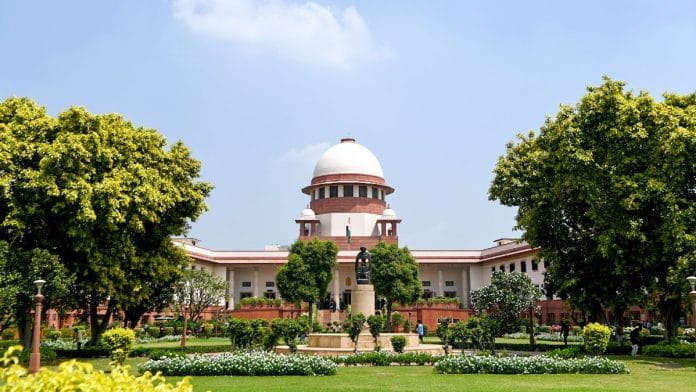New Delhi: Expressing views on social media on issues pending before courts does not mean the person expressing those views is “highly biased or opinionated” — with this noting, the Supreme Court Collegium has reiterated the name of advocate Somasekhar Sundaresan for his elevation as a judge to the Bombay High Court.
The Collegium also reiterated the names of Saurabh Kirpal for elevation to the Delhi HC, and those of Amitesh Banerjee and Sakya Sen for elevation to the Calcutta HC.
At a meeting held Wednesday, the Collegium — apex body on judicial appointments — led by Chief Justice of India (CJI) D.Y. Chandrachud and comprising Justices Sanjay Kishan Kaul and K.M. Joseph decided to re-propose Sunderesan’s name while rejecting the government’s objections to his elevation.
Sunderesan’s name was cleared by the Bombay HC on 4 October 2021 and forwarded to the central government by the Collegium on 16 February 2022. But nine months later, in November 2022, the government returned the files and sought the Collegium’s reconsideration of the recommendation.
His was one of ten names the government had expressed reservations about.
According to the Collegium resolution, Sundaresan’s reconsideration was sought because he aired his views on social media on several matters which are sub-judice — under consideration before the courts.
After considering the objection, the Collegium resolved that “the views on social media, attributed to the candidate, do not furnish any foundation to infer that he is biased”.
“The issues on which opinions have been attributed to the candidate are in the public domain and have been extensively deliberated upon in the print and electronic media,” the resolution noted.
It further added that the “manner in which the candidate has expressed his views does not justify the inference that he is a ‘highly biased opinionated person’ or that he has been ‘selectively critical on the social media on the important policies, initiatives and directions of the Government’ (as indicated in the objections of Department of Justice).”
The government placed no material on the record to indicate that expressions used by Sundaresan in his interviews suggested “his links with any political party with strong ideological leanings”, the resolution said.
Underlining that all citizens have the right to “free speech and expression under Article 19(1)(a) of the Constitution”, the Collegium resolution emphasised that “expression of views by a candidate does not disentitle him to hold a constitutional office so long as the person proposed for judgeship is a person of competence, merit and integrity”.
As for Sundaresan, the resolution stated that he has specialised in commercial law and would be an asset to the Bombay HC, which has a large volume of cases of commercial and securities laws, among other branches.
In its objection letter, the government referred to the Second Judges case decided in 1993 to say that a “candidate to be selected must possess high integrity, honesty, skill, high order of emotional stability, firmness, serenity, legal soundness, ability and endurance.”
According to the Collegium resolution, Sundaresan fulfilled all these qualities.
“Having regard to the above, the Collegium is of the considered view that Shri Somasekhar Sundaresan deserves to be appointed as Judge of the Bombay High Court. The Collegium, therefore, resolves to reiterate its recommendation dated 16 February 2022 for appointment of Shri Somasekhar Sundaresan, Advocate, as Judge of the Bombay High Court,” it said.
Also Read: Lawyers, judges worry as Centre seeks bigger role in judicial appointments, says report
Saurabh Kirpal, Amitesh Banerjee & Sakya Sen
Besides Sundaresan, the Collegium also reiterated Saurabh Kirpal’s name for his elevation to the Delhi HC. Saurabh was also part of the same batch of 10 names that were returned by the government in November 2022.
The Collegium also reiterated, for the second time, its recommendations of advocates Amitesh Banerjee and Sakya Sen for the Calcutta HC. Both Banerjee and Sen are sons of former judges of the same high court. Banerjee’s father, Justice U.C. Banerjee, headed the probe panel which found the 2002 Godhra train fire to be accidental, ruling out foul play.
The names of Banerjee and Sen were processed by the Calcutta HC on 17 December 2018 and approved by the SC collegium on 24 July 2019. However, the government referred their names back to the Collegium for reconsideration on 23 July 2021.
The SC Collegium reiterated its earlier recommendation of Banerjee on 1 September 2021. After receiving additional inputs from the government, the Collegium cleared his name for the second time on 8 October 2021.
The two files, along with seven others — five from Allahabad and two from Kerala — were, however, returned again by the government on 25 November 2022. These nine were cases of reiteration that were not processed by the government, despite the current appointment procedure making it mandatory for the central government to notify such names.
“The inputs which have been furnished by the Department of Justice in the file on 25 November 2022 do not contain any fresh material or ground. Moreover, after the Supreme Court Collegium reiterated the proposal on 01 September 2021, it was not open to the Department to repeatedly send back the same proposal which has been reiterated by the Supreme Court Collegium after duly considering the objections of the Government,” the Collegium noted while resolving to return the file for processing.
As for the remaining seven cases of reiteration, sources said the Collegium deferred its deliberations and has asked the respective state high courts for additional information on the candidates.
The Collegium in its meeting Wednesday also cleared some fresh names for high courts of Madras, Allahabad and Karnataka. With each recommendation, the Collegium has written an elaborate note to the government, giving reasons why a particular name has been cleared.
Reasons have also been furnished in cases that were rejected by the Supreme Court, but approved by the respective high courts.
(Edited by Amrtansh Arora)
Also Read: This is what was happening in India when the collegium system was born in 1993






